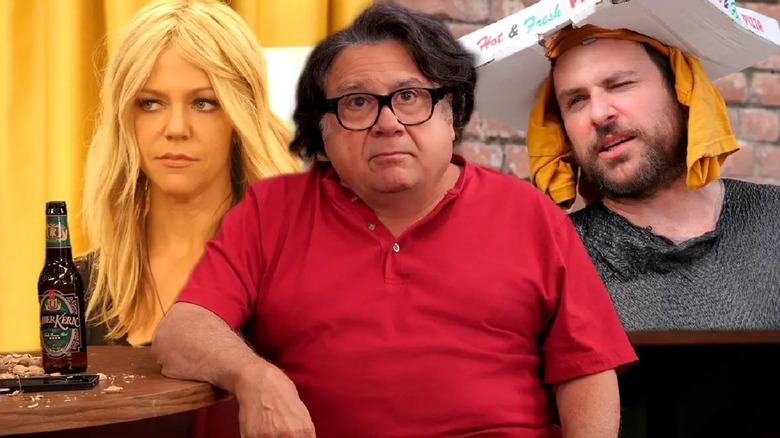
As the longest-running live-action American sitcom, with 15 seasons filmed and another four ordered at the time of writing, "It's Always Sunny in Philadelphia" has seen its share of ups and downs. While every season has at least one stand-out episode, the show tends to go in waves: It takes some big swings, finds a sweet spot, and then struggles somewhat before hitting another crest.
Part of what makes the series so satisfying is that, unlike the long-running comedies that begin relying on familiar jokes that grew stale years ago, the "Always Sunny" crew continues to challenge themselves and grow. While not every idea hits, it's impressive that the show continually works to sharpen its satirical voice and expand from its shock-comedy roots. With so much more on the way, now's a great time to look back at the peaks and valleys so far (just for the sake of simplicity, we'll limit our discussion to the episodes currently available on streaming).
Season 1
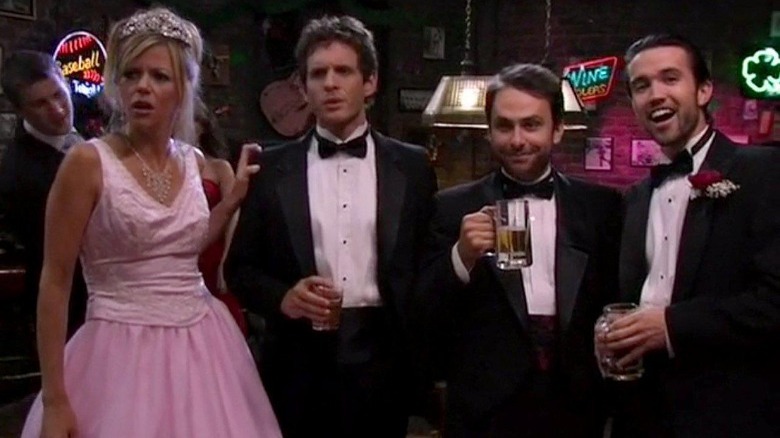
Very few series, particularly sitcoms, have good showings in their first seasons. It takes time for the writers to figure out their strengths and weaknesses, for the cast to gel, and for the show itself to find a unique voice in an archetype-driven genre. "Always Sunny" doesn't have a terrible first season, but it's definitely the show's weakest. "The Gang Gets Racist" is an incredible pilot that nails the cast's boorish solipsism, but the absence of Danny DeVito (who is introduced in season 2) is keenly felt.
The writers are also clearly still working to figure out how to depict horrible people without inadvertently valorizing them. During the season's lower points, the characters feel too close to real-world scumbags you'd meet on the street. Considering that Rob McElhenney, Charlie Day, and Glenn Howerton had a hand in most of the scripts and needed to figure out how to stage, shoot, and act in the show, it's no wonder that season 1 feels like the intense learning experience that it is.
Season 11
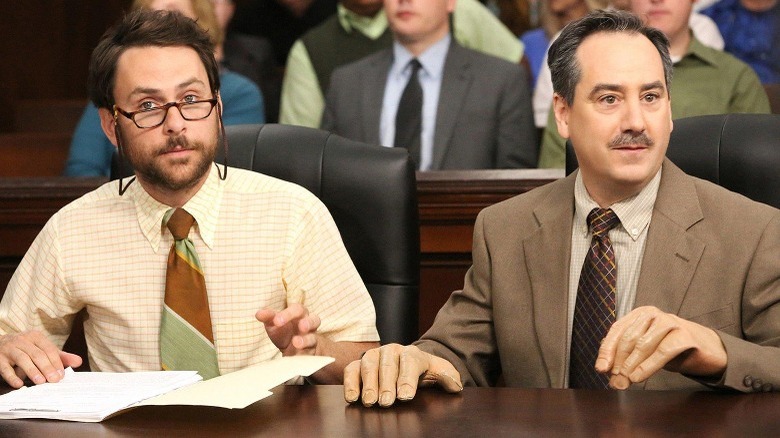
Season 11 was the first one to air after the series was supposed to wrap up with season 10, and it can't escape the downright palpable sense of terrified awkwardness that suffuses the text. It's also home to the show's single worst episode, "Being Frank." "Always Sunny" has always struggled with Frank's role; his unnamed wealth opens up opportunities to get weird and his chaotic energy is a vital part of the ensemble's dynamic, but, because he's just a walking ball of (usually gross and bigoted) impulses, the writing tends to suffer when he becomes an episode's emotional lynchpin. It works in "Frank Falls Out a Window," which is a speedrun of season 2 with an added 10 years of technical experience, but "Being Frank" literally shackles the viewer to Frank's perspective. It's not only metaphorically but literally painful to watch, thanks to the shaky camera and filters representing Frank's altered states.
Even in a season that's off its game, though, there are high points. "The Gang Hits the Slopes" gives Glenn Howerton a chance to shine as a comically evil '80s villain. "Mac & Dennis Move to the Suburbs" is a great two-hander, even if it unravels itself slightly too quickly. The greatest joy of season 11, though, is a reward for viewers who've kept track of every running background thread. "McPoyle vs. Ponderosa: The Trial of the Century" unashamedly indulges in the show's longevity and makes the best of it, while also delivering the very important statutes of Bird Law. It's also completely impenetrable to casual fans.
Season 2
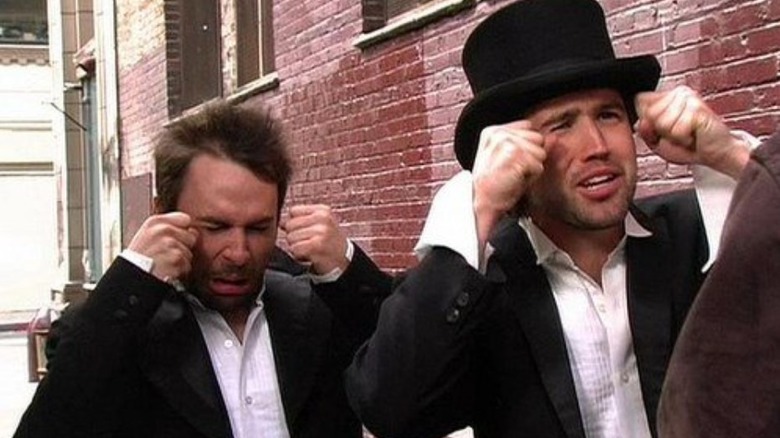
Adding Danny DeVito to the "Always Sunny" cast makes a world of difference. Frank Reynolds hasn't fully developed into the unhinged embodiment of id that he'd become in later seasons, but from the beginning he serves as a trump card when it comes to plotting. Later on, that'll be because the character leans so hard into his wild impulses that he'll blow up the group's initial goals in order to do something much weirder; here, it's because he's got money and the influence to pull the plug on whatever the gang is trying to do. He stands in for the beleaguered straight man, a job that's almost immediately handed off to guest stars and recurring secondary characters. This is also the only season to use the aptly named and gone-too-soon Anne Archer as the acidic Barbara Reynolds, who's unique as a horrible person who isn't beholden to the emotional rat king of the Paddy's Pub gang.
In season 2, the writing is still finding itself overall. "Dee and Dennis Go on Welfare" might be the series' first stone-cold classic, not only committing to a bit until it blossoms into total absurdity but introducing a character detail that unexpectedly becomes a fixture in the show's downright extensive lore. But the season is still intensely 2006 in places, and even its best episodes have aged considerably. The highs are high, but the lows range from forgettable to being something of a chore to watch.
Season 10
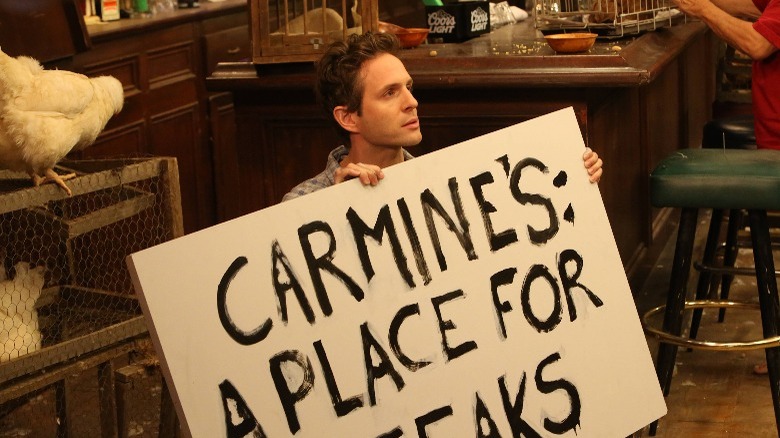
Season 10 feels like another end of a cycle. To say it's "grasping at straws" would be an insult to the level of craft at work, but if the show isn't outright hitting a wall, it feels like one might be around the next corner. Episodes dip into comfortable formulas and end up just shy of the mark. The upsetting-a-rational-human episode "The Gang Goes on Family Fight" is an agonizing exercise in secondhand embarrassment despite the very game contributions of Keegan-Michael Key, while "Psycho Pete Returns" fails to recapture the heights of "The Gang Gets Analyzed." There are still highlights, like the bottle episode "The Gang Beats Boggs," but there's only one episode this season that's a must-watch.
"Charlie Work" is rightly considered one of the best, maybe even the very best, episodes of "It's Always Sunny in Philadelphia." Not only is it a great character-focused episode that shows why Charlie is the glue holding the gang together, but it's also a great showcase of Charlie Day's appealing physicality and a technical marvel that mimics a single tracking shot (before you ask, the crew wrote and shot the episode before "Birdman" came out). An entire season's worth of magnetic energy pours out from those 22 minutes, and it's a terrible shame that, as part of an ongoing series of snubs, this episode received zero awards recognition.
Season 14
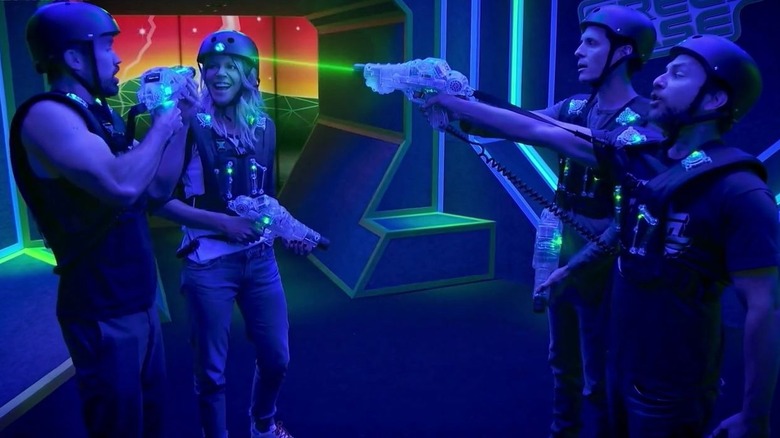
In hindsight, season 14 sits in an unfortunate position, sandwiched between the fantastic season 13 and the back-to-basics season 15. It firmly occupies the functional middle ground, exhibiting some of the same issues as season 10. "Thunder Gun 4: Maximum Cool" is an okay but lesser take on the fantasy sequences found in episodes like "The Gang Saves the Day" (though it's an improvement on the "Lethal Weapon" episodes and their struggles with ironic blackface). "The Gang Texts" is an appealing play on the structure of a typical episode, but it doesn't reach the Action Park-level carnage of "The Gang Goes to the Water Park." And so on.
The exception to this general mid-tier quality is the season finale, "Waiting for Big Mo." It wasn't the first time that the "Always Sunny" writers used classic literature as inspiration — "The Gang Goes to Hell" is a two-part riff on Sartre's "No Exit," with a guest cameo by the coin from "Rosencrantz and Guildenstern Are Dead." But "Waiting for Big Mo" is more contained, and "Waiting for Godot" fits a little better with the tone and themes of "Always Sunny." By the end, the characters are still waiting at the laser tag joint, and they'll never change. Same as it ever was. It's bleak, but it also encapsulates the way the cast is locked together, more or less unchanged, forever. It's a perfect spiritual finale – regardless of when the show actually comes to a close – that recalls the famous last episode of "Seinfeld."
Season 3
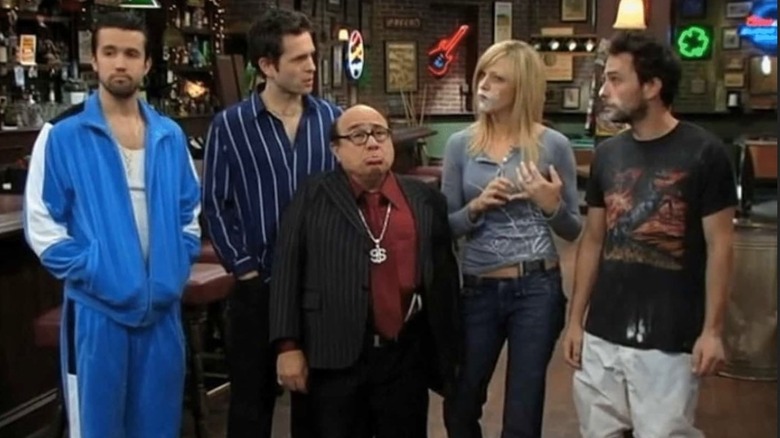
One of the most notable things about "It's Always Sunny in Philadelphia" is how the balance between comparatively grounded episodes, like those that make up season 1, and the more cartoonish and experimental outings of later seasons shift over time. Season 3 can be considered the last transitory step towards a solid sense of what the show really is, weaving in some of the last missing elements and taking big swings to calibrate the overall tone. Episodes like "Frank Sets Sweet Dee on Fire" fine-tune the reliable punchline of cutting from a line of dialogue to a completely contradictory title card; "The Aluminum Monster vs. Fatty Magoo" takes one of the first looks back at the gang's high school days; and "The Gang Dances Their Asses Off" is a prime example of how the writers sometimes inexplicably model an episode on an older, obscure film (in this case, "They Shoot Horses, Don't They?").
On the flip side, "The Gang Gets Invincible" is too focused on repeatedly name-dropping the film it's patterned after. It's not meta as much as it's awkward, especially given that "Invincible" retains absolutely no place in the public consciousness — something the writers themselves acknowledge. The show still has a shaky relationship with slurs, too, particularly those referring to intellectual disability; while the cast is made up of horrible people, the legacy of series like "South Park" show that it's quite easy for the audience to wholeheartedly replicate characters' abhorrent behavior under the paper-thin guise of "irony." And because "Always Sunny" does understand this danger, it leaves some extra cringe on titles like "Sweet Dee's Dating a [Redacted] Person."
Season 12
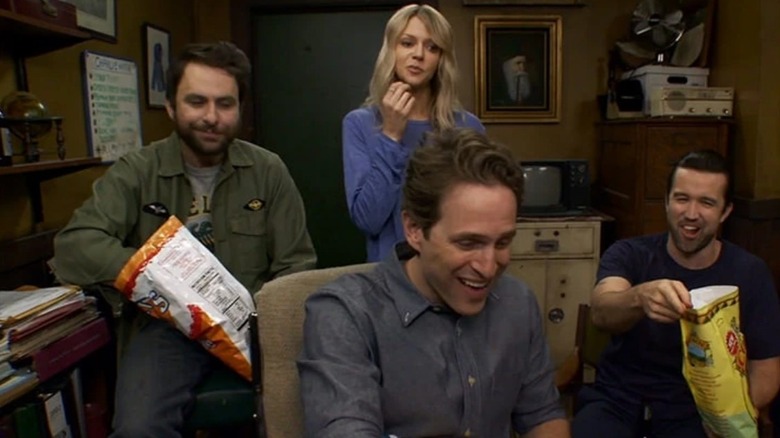
As "It's Always Sunny in Philadelphia" gets back on its feet after the stumbles of season 11, season 12 kicks off the "even these schmucks know better" era. The writers have always emphasized that these characters are horrible people, but 12 marks a more conscious attempt to be aware of their own perspective, given how often the show interacts with bigotry and marginalization. It's very much a learning process. "The Gang Turns Black," for example, comes from a white writers' room and director, and only manages to reach the general conclusion that there is systemic racism and police brutality in America. By contrast, "Hero or Hate Crime" is much more firmly in the writers' wheelhouse. The script is a little self-conscious, but the episode is built around a classic hook and delivers genuine catharsis when it finally lets Mac come out of the closet.
"Making Dennis Reynolds a Murderer" returns to season 3's problem of relying on a too-specific parody (really, how many people are going to be thinking about "Making a Murderer" by 2025?), but "The Gang Goes to a Water Park" is a classic return to form and proves that the show still has the goods. And, yes, sometimes it's just fun to have some overtly meta jokes and really good recurring cast members. Thank you, "Old Lady House: A Situation Comedy."
Season 7
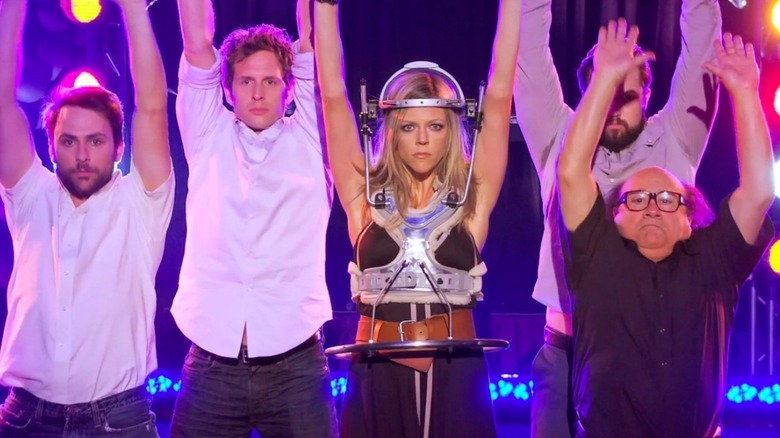
Season 7 is a tipping point for viewers, ushering in the more high-concept and exaggerated episodes that characterize several subsequent seasons. It also contains another episode commonly pegged as the show's worst, even though it features an inspired performance by the late Lance Reddick. For those who prefer storylines with at least one foot in the real world, episodes with a Blaxploitation parody and the gang ruining a children's beauty pageant might be less appealing. And yet, the escalating ridiculousness yields scenes par excellence, including a trip to the Jersey Shore that ends with Dee and Dennis having to dig their own graves, a real-time race across Philadelphia to make it to a movie theater, or the latter-day successor to Calvinball, "Chardee MacDennis."
The season's two-part finale, "The High School Reunion," is not just a graceful incorporation of established backstory that still remains accessible to less experienced viewers. In addition, its big dance sequence executes a predictable but hysterical joke while serving as an impressive technical achievement on the part of the cast. It would be inaccurate to call it all a summit, since there isn't a single season without several excellent episodes, but it's definitely a moment of punctuation.
Season 6
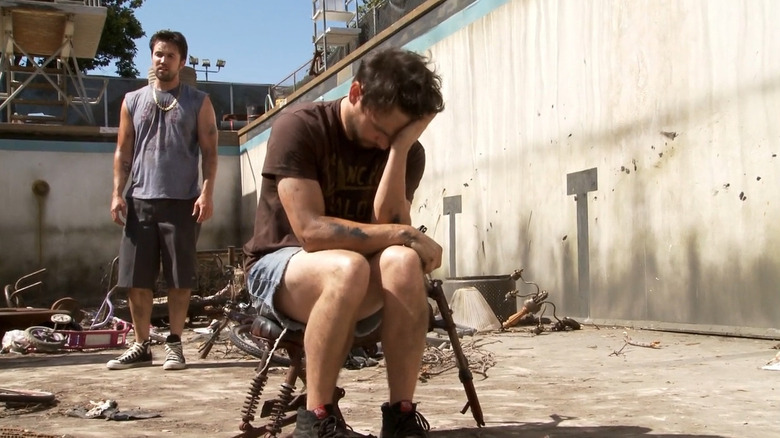
Despite the writers' dedication to continuity, season 6 features the show's first concentrated attempt at a season-long story arc. In pragmatic terms, it's a way to work around Kaitlin Olson's pregnancy, and straightforwardly incorporating a surrogacy storyline avoids the awkwardness of dressing pregnant actors in empire-waisted costuming and having them hold ever-larger bags. From a narrative perspective, however, the best thing it does for the show is give a respectful send-off to the often hard-done-by Carmen, the trans girl whose original role centered around her penis and Mac's embarrassment at being attracted to her. In season 6, she's happily married and well outside the Gang's reach, and the season ends on a nice grace note for the character.
The pregnancy plotline also yields easily the best "multiple unreliable narrators describe the same event" episode. "Who Got Dee Pregnant?" is both comedic gold and a satisfying puzzle box that clicks together over the course of 20 minutes. And, of course, the double-length "A Very Sunny Christmas" needs no introduction. While it would be impressive for the Rankin & Bass parody alone, the episode also strikes that balance of filthy and strangely sweet that defines the show's best moments. While season 6 as a whole isn't as consistently stuffed with home runs as the very best, it shows the kind of growth from the writers' room that has made "Always Sunny" worth following for almost 20 years.
Season 5
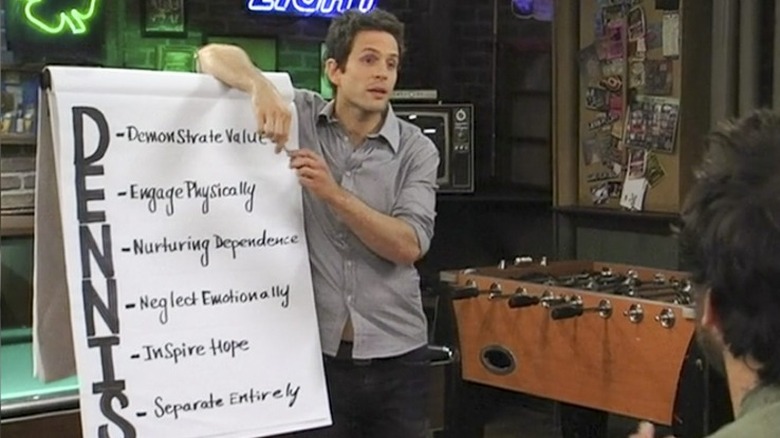
If we were working purely from the showrunners' thoughts, season 5 would be crowned the best. It definitely contains one of the show's most memorable episodes: "The D.E.N.N.I.S. System," which pushed Dennis from someone with garden-variety vanity into a Patrick Bateman-esque malignant narcissist. "Paddy's Pub: Home of the Original Kitten Mittens" also deserves a shoutout for delivering a twist on the show's established formula of setting the Gang loose on a normal person in order to torment them; while it's a trope that's continued to serve "Always Sunny" well, having the Lawyer appear in several episodes as a beleaguered bystander only to pull a much more successful scam on the main cast shakes up expectations and capitalizes on the continuity bestowed to even very minor characters.
What holds season 5 back in a meta-analysis like this is the way its misadventures shake out. This run of episodes builds on the seeds of season 4, cementing "Always Sunny" as a show about a bunch of scheming, horrible losers who still, weirdly enough, kind of like one another at the end of the day. But a disproportionate number of season 5's episodes drop the hammer extra hard on Dee. This stands out, particularly because, in the early days, the series let its actresses embrace the same terrible behavior as their male co-stars. Too many sitcoms of the 2000s (and today) make their token female cast member a scolding wet blanket, and "Always Sunny" has always openly defied that trope. But because Dee doesn't get to lead that many of the season's plots — and because there aren't many episodes in which the guys, not Dee, take the biggest dive — the gender disparity ends up standing out more than usual.
Season 15
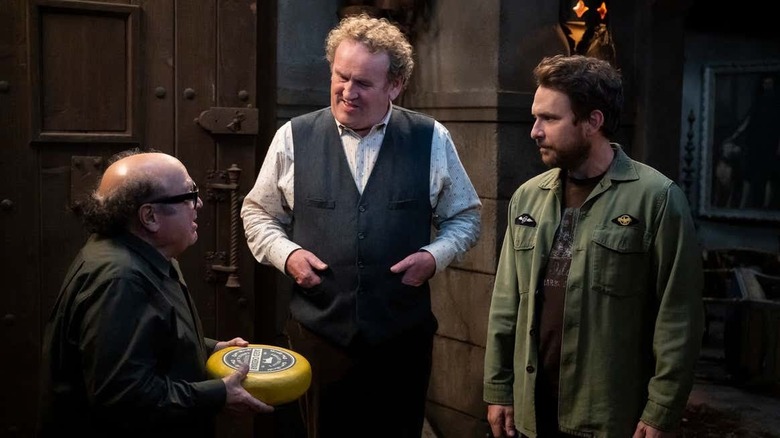
With a shorter episode count than normal, season 15 wisely focuses on the core cast. Unlike some of the other date-stamped episodes of the show, "2020: A Year in Review" ends up being strangely satisfying simply because the show was willing to acknowledge the pandemic when so many other ongoing series weren't. "The Gang Buys a Roller Rink" is a rare break from the show's carefully maintained continuity, but it sells itself well enough on tongue-in-cheek '90s vibes.
But the real highlight of season 15 is the first extended storyline since Dee's pregnancy in season 6. It's a kind of concentrated narrative style that wouldn't suit the show in the long term, but it successfully shakes off the doldrums of season 14. Colm Meaney fits right into the cast as a recurring guest, initially coming across as one of the many hapless straight men the gang have encountered over the years, only to later reveal his own quietly deranged streak. Season 15 even has thoughtful themes and complete character arcs, particularly Mac and Charlie's search for a sense of identity. Like season 13, it also earns an authentic moment of emotional catharsis. While we miss the extended cast, this brief return to basics is exactly what "Always Sunny" needed.
Season 13
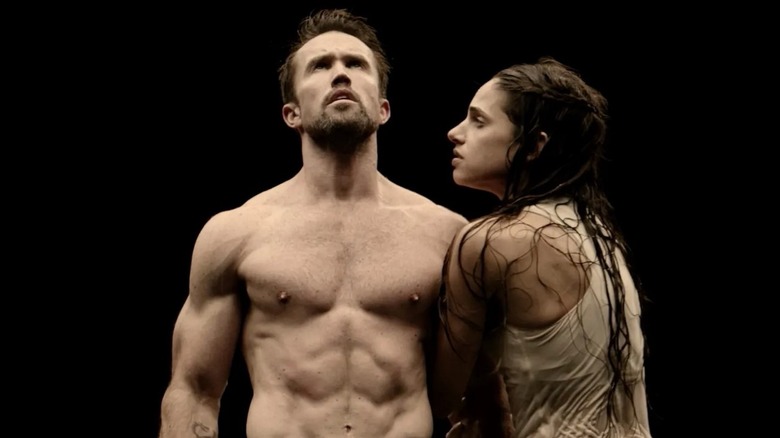
While some of its early episodes are a bit rocky, season 13 is arguably the best of the post-10 era. "The Gang Makes Paddy's Great Again" is a brilliant play on the audience's well-trained ability to sense the show's rhythms, and addresses the issue of such a long-running series becoming predictable. "The Gang Does a Clip Show" starts with a standard take on the formula and devolves into the surreal. The two episodes that target "timely" subjects — specifically, the Me Too movement and discriminatory bathroom bills — have a stronger grasp of where they're going than season 12's experiments (though they're still noticeable for addressing cultural conversations that hadn't been in the spotlight for very long).
What pushes season 13 above and beyond are the three episodes that round it out. "Charlie's Home Alone" might be a better showcase of Charlie Day's physical comedy prowess than "Charlie Work," and the fusion of "Home Alone" and "Saw" is downright elegant. Its companion episode, "The Gang Wins the Big Game," is a little "Mr. Magoo" and a lot of endearing excitement about the Eagles, which bleeds over into an episode that feels like an ode to Philadelphia as a community. But the real grace note is the way "Mac Finds His Pride" manages to earn complete and utter sincerity in a show that's so frequently about how the characters hate each other (even if they also need one another).
Season 8
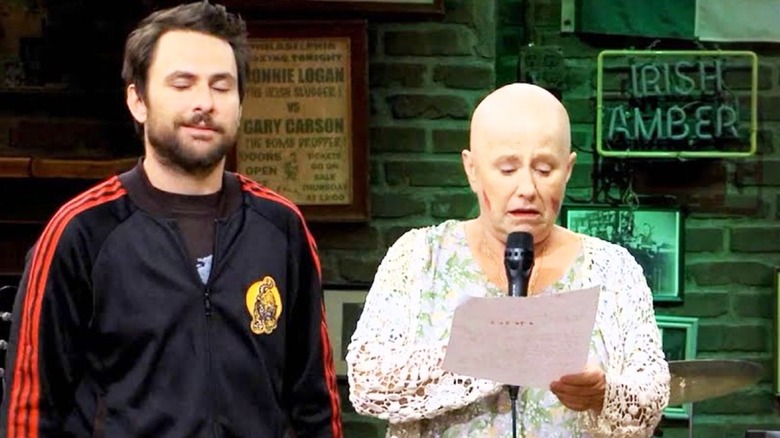
Like many long-running shows, "Always Sunny" goes in cycles. Season 8 resembles season 3, with a lot of big swings as it settles into a new rhythm featuring more absurd, bombastic plotlines and a greater focus on the show's intricate lore. The most successful episodes in this batch all return to old plotlines. "Pop-Pop: The Final Solution" brings back Dee and Dennis' grandfather with a classic A-plot, in which the twins go to increasing lengths to avoid any kind of moral responsibility, even though the answer to the question "is it okay to pull the plug on a comatose Nazi?" is fairly clear-cut. "The Maureen Ponderosa Wedding Massacre" is another Rashomon-style narrative that features the two biggest recurring families in the "Always Sunny" universe. "Charlie's Mom Has Cancer" capitalizes on the incredible, always-reliable chemistry between Lynne Marie Stewart and Sandy Martin.
The crowning achievement, though, is "The Gang Gets Analyzed," the show's best example of what happens when a rational person is exposed to the core cast's rampant ids. It's a satisfying exploration of the kind of armchair think-piece that viewers love to engage in, wrapped in a believable set-up and anchored by Kerri Kenney's reserved distress.
The issue with such a high density of callbacks means that the less successful episodes can't help drawing comparisons to better versions of themselves: "Charlie and Dee Find Love" echoes the untouchable "The Nightman Cometh," "The Gang Dines Out" recalls the mutually assured destruction of "Mac's Banging the Waitress," and so on. None of the episodes in this batch are outright bad, but some can't quite reach their own self-imposed bars.
Season 4
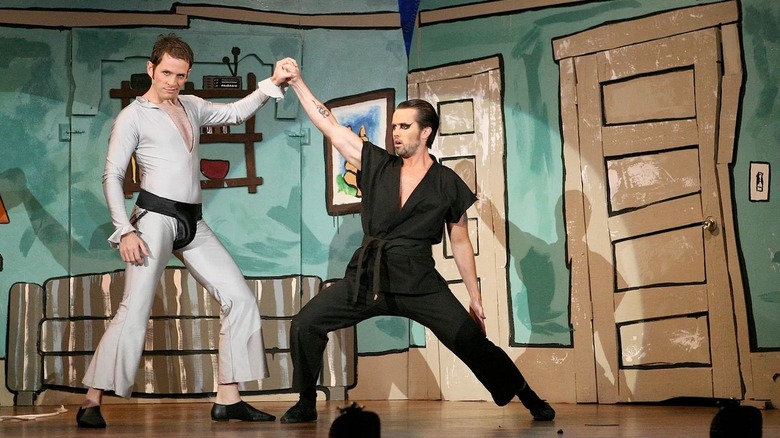
This might be the show's first nearly perfect season. The cast dynamics are locked in, recurring side characters like Artemis, the McPoyles, and Cricket appear throughout, and it has an even mix of conceptually out-there episodes and installments that zero in on the relationships between the core cast members. But what really puts season 4 near the top is the one-two punch of "Sweet Dee Has a Heart Attack" and "The Nightman Cometh." The former birthed the iconic conspiracy board meme, while the latter remains one of the best episodes of "It's Always Sunny in Philadelphia," period. Beyond their utility as jokes, the songs are memorable and catchy, every character gets a moment in the spotlight, and the central set piece kills. It's also a crucial reminder that Charlie is, in fact, just as terrible as the rest of the gang.
More divisive is the period-piece parody "The Gang Cracks the Liberty Bell," which is as cartoonish as "Always Sunny" gets. While its framing device, in which the Gang builds on one another's lies in order to create a conflicting narrative, is a good one, it's better executed in later seasons. Still, there's a demented joy in the cast's dedication to the bit and their clear enjoyment of the period trappings. "Who Pooped the Bed?" finally gives Kaitlin Olson and Mary Elizabeth Ellis a chance to bounce off one another in a solid parody of drawing room mysteries, and "The Gang Solves the Gas Crisis" is a prime example of how skillfully "Always Sunny" escalates mundane situations into pure madness.
Season 9
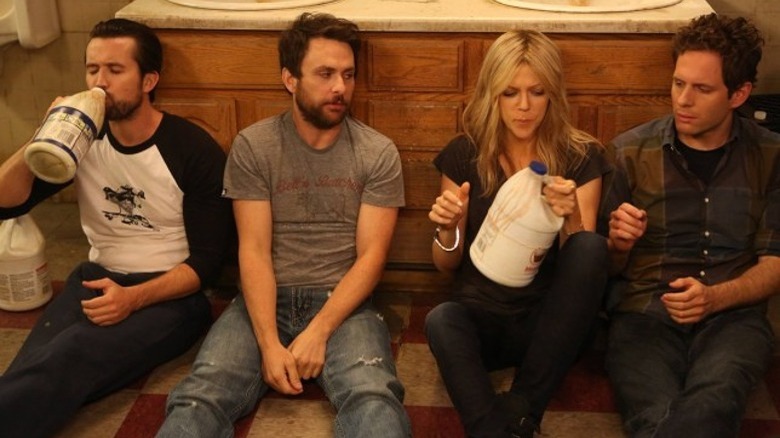
Following on the big swings from season 8, we've arrived at the perfection of the over-the-top "Always Sunny" plot. The writing fires on all cylinders here, as each character gets an excellent focal episode to show off their particular neuroses and flaws. "The Gang Broke Dee" is a particular highlight that returns to some of the weaker tendencies of season 5, provides great material for Kaitlin Olson, but has the maturity of focus to let her bring herself down rather than focusing on the guys' machinations in the background. We also get two of the show's greatest guest spot episodes: "Mac Day," brings the closeted aspect of Mac's character into focus in a way the show's somewhat struggled with since shifting away from jokes about Carmen; and "Flowers for Charlie," a "Pacific Rim" reunion with an incredible punchline.
It would be a crime not to mention a great episode that doubled, maybe tripled its resonance in hindsight. "The Gang Gets Quarantined" was great when it came out, became bizarrely prophetic when 2020 hit, and still sells as one of those moments of clarity that continues to lurk in the background of future episodes. This season crystallizes, so far, the best strength-to-strength plotting of how the show has evolved, with the full checklist of great concepts, killer guests, and strong character focus. It's pretty hard to beat.
Read this next: 12 Underrated Sitcoms That You Should Check Out
The post Every Season of It's Always Sunny in Philadelphia, Ranked Worst to Best appeared first on /Film.

